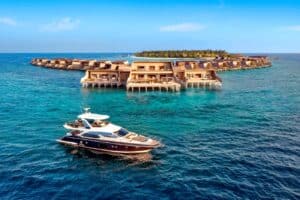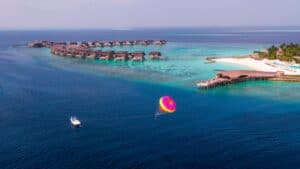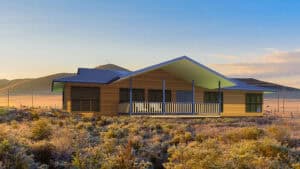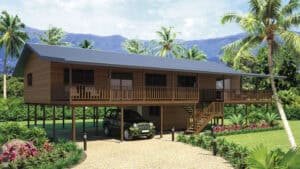
When you hear the word bungalow, chances are you imagine a tropical escape, perhaps a villa perched over turquoise waters or a cozy beachfront hideaway surrounded by palm trees. In modern resort and housing design, bungalows have evolved into several distinctive styles—each one tailored to different landscapes, lifestyles, and budgets.
In this article, we’ll explore three popular bungalow types: Overwater Bungalows, Over-Land Bungalows, and Stilt Bungalows (Bungalows on Posts). Whether you are a developer, resort owner, or a traveler dreaming of your next getaway, understanding these categories will help you make the right choice.
Overwater Bungalows: The Icon of Paradise
Few images are as iconic as an overwater bungalow in the Maldives or Bora Bora. Built on stilts directly above calm lagoons, these villas deliver the ultimate luxury:
- Direct access to the ocean by private ladder
- Glass floor panels to watch marine life
- Privacy and exclusivity away from the shoreline
For resorts, overwater bungalows are brand-defining units. They attract honeymooners, create viral marketing images, and justify premium nightly rates. Construction, however, is more complex, requiring careful engineering against tides, saltwater corrosion, and storms.

Over-Land Bungalows: Comfort and Flexibility
On the other side, over-land bungalows (also called beachfront bungalows or garden villas) are built directly on the coast or just a few steps away from the beach. They provide the same tropical lifestyle but with:
- Easier construction and lower maintenance costs
- More flexibility in design (private pools, gardens, shaded patios)
- Family-friendly layouts with larger footprints
For developers, over-land bungalows form the backbone of revenue. They are easier to scale in clusters and offer year-round appeal to a wider audience.

Stilt Bungalows: Elevated Living in Challenging Environments
In many parts of the world—from Papua New Guinea to Southeast Asia—building on the ground simply isn’t practical. Heavy rainfall, flooding, and poor infrastructure make stilt bungalows (bungalows on posts) the ideal solution.
These homes are raised 2 meters or more above ground on strong steel or timber posts. The design offers unique benefits:
- Protection against flooding and ground moisture
- Natural ventilation that keeps interiors cooler
- Space below the house for parking, storage, or livestock
Stilt bungalows are not only functional but also culturally rooted in traditional architecture, echoing the 吊脚楼 (Chinese stilt houses) or rumah panggung in Indonesia.

Choosing the Right Bungalow for Your Project
The choice between overwater, over-land, and stilt bungalows depends on your location, budget, and target market:
- Resorts in tropical lagoons may invest in overwater bungalows for maximum impact.
- Beachside developments benefit from over-land bungalows for scalability and family appeal.
- Rainy or flood-prone regions require stilt bungalows for durability and safety.
For developers, combining these styles often creates the best business model: flagship overwater units for branding, over-land villas for steady occupancy, and stilt homes for challenging terrains.
Final Thoughts

Bungalows are no longer just a single-story house; they’ve become a symbol of freedom, lifestyle, and adaptability. From the crystal-clear waters of the Maldives to the lush coasts of Fiji and the high-rainfall islands of Papua New Guinea, the right bungalow design can transform a project from ordinary to extraordinary.
If you’re planning a resort, eco-community, or housing development, consider the full spectrum: Overwater, Over-Land, and Stilt Bungalows. Each carries its own charm, engineering logic, and market value—and together, they represent the future of modern tropical living.
| Type | Typical Location | Construction Difficulty | Approx. Cost (Relative) | Target Market | ROI Potential | Key Advantages |
|---|---|---|---|---|---|---|
| Overwater Bungalow | Calm lagoons, shallow seas (Maldives, Bora Bora) | High – requires marine piling, corrosion protection | $$$$ (highest) | Luxury travelers, honeymooners, high-end resorts | High brand value, premium nightly rates but slower payback | Iconic, exclusive, direct ocean access |
| Bungalow | Beachfront, coastal gardens, resort grounds | Medium – standard foundation and utilities | $$–$$$ (mid-range) | Families, group travelers, scalable resort inventory | Strong – forms the revenue backbone of most resorts | Flexible design, easier maintenance, scalable clusters |
| Stilt Bungalow (Bungalow on Posts) | Rainy/flood-prone areas, poor ground infrastructure (PNG, SE Asia, Pacific islands) | Medium – requires elevated steel/timber posts | $$ (cost-effective) | Practical housing, eco-resorts, communities in flood zones | Moderate – high occupancy and safety value in niche markets | Flood protection, ventilation, multipurpose lower space |
visit https://www.deepbluehome.com/bungalow for more plans and price.

